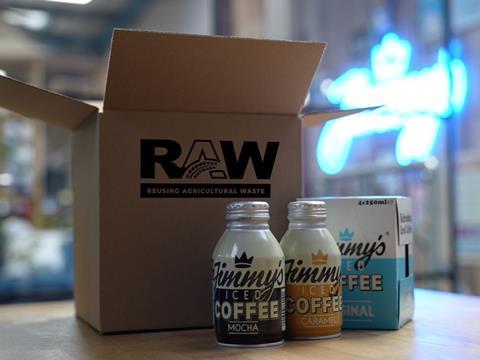
Jimmy’s Iced Coffee has completed trials using RAW Packaging’s ‘zero tree’ concept, in which crop waste is converted into packaging in a bid to combat deforestation and lower carbon emissions, and will now introduce the new cartons across its e-commerce product line.
Zero tree packaging utilizes agricultural by-products that would otherwise go to waste, like wheat and sugar cane bagasse. It is expected to reduce the packaging industry’s reliance on wood, which would in turn cut down on the number of trees felled, sometimes illegally, to produce paper and cardboard.
According to RAW Packaging, zero tree packaging offers the same quality, strength, and appearance as corrugated board while reducing carbon emissions by 28% compared to virgin paper and 7% compared to European paper. Additionally, it claims to require less energy to produce.
In line with its B Corp status, Jimmy’s Iced Coffee hopes that the transition will contribute to sustainable consumption, environmental preservation, decarbonization, and an expansion of its consumer base through sustainability-minded practices.
“By switching to packaging made from crop waste, we are helping to change the mindset of where materials are sourced from, a critical step in conserving our planet’s vital ecosystems,” explained Ben Nethersole, head of Operations at Jimmy’s. “Furthermore, this environmentally conscious approach significantly lowers carbon emissions, playing an integral role in combating climate change.
“Incorporating zero tree packaging into our e-commerce range underscores our commitment to sustainability while appealing to a wider audience that values eco-friendly alternatives. We believe this initiative will resonate with environmentally conscious consumers and reinforce our dedication to making responsible choices throughout our business operations.”
Back in 2022, Test Valley Packaging and envoPAP launched Reused Agricultural Waste, or RAW. Initially utilizing by-products from Indian sugar cane farms, the production process was compared to that of wood pulp and then claimed to use the same amount of energy as paper and cardboard production processes.
Since then, other projects have sought to reuse natural by-products to create packaging. AIMPLAS is working to convert plant waste into packaging and adhesives using solvent-free mechanochemical techniques – a process hoped to keep harmful substances out of landfill and the natural environment.
If you liked this story, you might also enjoy:
The Brief: How viable is biorecycling for plastics?
Report: How the top brands are progressing on packaging sustainability
The Brief: Using ocean-bound plastic in packaging – how, why and should we?














No comments yet